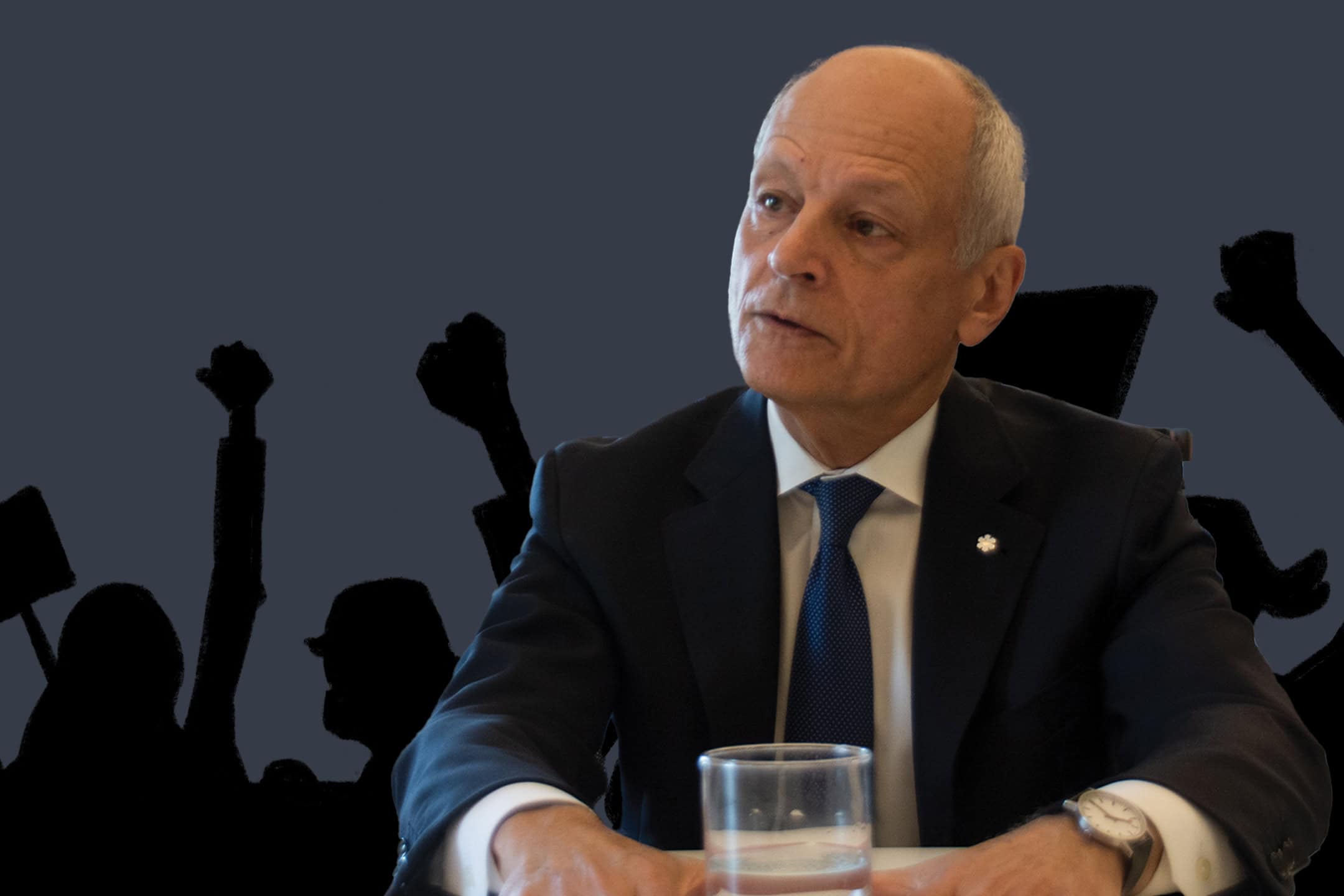Content warning: This article mentions antisemitism and anti-Palestinian racism.
On September 23, U of T President Meric Gertler issued his remarks at the Conference on Historical and Contemporary Antisemitism, an academic event hosted by the Lab for the Global Study of Antisemitism.
UofT Occupy for Palestine (O4P) — the student group that held the 63-day encampment at King’s College Circle — criticized Gertler’s remarks in an Instagram post as being “textbook anti-Palestinian racism.”
Gertler’s remarks
The Conference on Historical and Contemporary Antisemitism was a two-day event hosted by the Lab for the Global Study of Antisemitism at the Anne Tanenbaum Centre for Jewish Studies. The event brought together several scholars and U of T researchers with extensive expertise in antisemitism studies, marking the first academic event focused on the interdisciplinary study of antisemitism.
During the conference, Gertler spoke about the rise of antisemitism at U of T and key initiatives the university will take to combat antisemitism and all forms of racism.
He noted that Hamas’ October 7 attack on Israel and its aftermath created “a dramatic and deeply troubling upsurge in antisemitic acts and speech — a development that has shown itself across society, and quite dramatically at institutions of higher education, including the University of Toronto.”
“While there has been increasing concern about antisemitism on our three campuses for some time, it was greatly intensified by the presence of the encampment at the heart of our St. George campus,” said Gertler, “and [the concern] remains evident in this new academic term, as tensions over the war in Gaza continue to manifest themselves.”
Gertler noted that while Justice Markus Koehnen — the judge who presided over U of T’s injunction hearing to remove the encampment — found that encampment protesters didn’t engage in antisemitic language or actions, “many members of the community experienced deeply offensive incidents of antisemitism in the vicinity of the encampment.”
“Let me acknowledge, here and now, that those incidents have caused undeniable harm to members of the Jewish community at U of T and to the [u]niversity as a whole,” said Gertler.
Gertler also acknowledged the ongoing efforts the university is taking to address antisemitism. He noted that he recently convened with an “informal group of academic colleagues,” to consider developing a definition of antisemitism for the university.
“Discrimination based on creed or place of origin does not cease to be prohibited simply because the word ‘Jewish’ or ‘Israeli’ is replaced with the word ‘Zionist,’” said Gertler.
In addition to this, he highlighted a few other initiatives, including the decision in April to no longer make statements on “matters of scholarly debate or contentious political issues;” enhancing the capacity of students, faculty and staff to “discuss and debate difficult, politically charged issues across positions of difference” through English Professor Randy Boyagoda’s Civil Discourse Working Group; and developing a User Guide to U of T Policies on Protest and Use of Campus Spaces to provide a clear outline of university protest policies, which some organizations across campus criticized.
Finally, addressing student protesters’ calls on the university to terminate all partnerships with Israeli academic institutions that support the violence in Gaza, Gertler mentioned “We remain unequivocally opposed to academic boycotts — targeting scholars or institutions simply because of the country in which they are located” and that U of T will continue supporting academic collaboration with scholars and universities in Israel.
“I and the rest of the leadership of the university are fully committed to addressing this challenge, to help avoid further injury and to move our community forward,” he said.
Student concerns
In an Instagram post on October 1, O4P criticized Gertler’s remarks and broke down key parts that they deemed problematic.
O4P wrote that Gertler’s remarks “whitewashed Israeli crimes while dehumanizing Palestinians” and that he “frames Israel’s genocide as a defensive war.”
“In his address, Gertler laid the groundwork for suppressing pro-Palestine speech on campus, saying U of T will “clarify” its definition of antisemitism while suggesting pro-Palestine activists use the word “Zionist” as a substitute for “Jewish,”” wrote O4P.
In an email to The Varsity, Sara Rasikh — a second-year masters student studying social justice education and an O4P spokesperson — expressed being troubled by Gertler’s remarks. “It was disheartening to see the [p]resident of the University of Toronto, someone in such a powerful position, perpetuating narratives that silence and delegitimize Palestinian voices, especially at a time when the atrocities committed against Palestinians are so glaringly evident,” wrote Rasikh.
In a statement to The Varsity, a U of T spokesperson wrote that they “do not typically respond to social media postings.”
They added that “Students and other members of the community who have feedback are encouraged to contact the appropriate office or [d]ivision to express their concerns.”
In response to the spokesperson’s statement, Rasikh wrote that “Social media is a powerful platform for marginalized communities to express their voices, and dismissing these platforms reflects the university’s unwillingness to engage in a meaningful dialogue about its complicity in anti-Palestinian racism.”



No comments to display.